French Bulldogs have continued to gain popularity over the years and are a favorite amongst dog lovers. If you are considering adding a Frenchie to your family, this article will give you all the information you need to know about the French Bulldog breed.
The information provided herein is for informational purposes only. Please refer to our disclaimer for more details..
Quick Facts
• Origin: France
• Breed Group: Non-sporting group
• Size: 11 to 13 inches tall at the shoulder, up to 28 pounds
• Lifespan: 10 to 12 years or more with proper care
• Coat: Short, smooth coat with minimal to moderate shedding. They come in a variety of coat colors including brindle, fawn, cream, and white.
• Personality: French Bulldogs are smart, playful, and affectionate bundles of joy. They make excellent companions and even great watchdogs.
• Exercise Requirement: French Bulldogs should receive short daily exercise. Caution should be taken when choosing appropriate forms of physical activity since these dogs cannot swim and are prone to breathing problems and overheating.
• Training: Frenchies can be a little stubborn but these intelligent little dogs often do well with training and positive reinforcement.
• Grooming: Their coat makes grooming fairly low maintenance and weekly brushing is usually sufficient.
• Health: With responsible breeding and routine veterinary care, French Bulldogs tend to be quite healthy. However, there are some health issues Frenchies are predisposed to such as brachycephalic airway syndrome.
Breed Overview
The French Bulldog has become one of the world’s most popular dog breeds. This breed is known for its look as a miniature Bulldog with iconic bat ears.
The breed originated in France in the mid to late 1800s as a result of crossbreeding Toy Bulldogs from England with local Parisian ratting dogs. These dogs were considered fashionable and were often sought after by artists and society ladies.
French Bulldogs have continued to remain popular with a wide variety of owners in modern society. This is likely because Frenchies have a friendly disposition and are relatively low maintenance regarding their exercise and grooming needs.
Personality
Often described as smart, playful, and affectionate, French Bulldogs are generally known to have a good temperament. Frenchies are friendly and are typically good with children and other dogs.
French Bulldogs don’t bark excessively but will alert their owners when necessary, making them fine watchdogs. Frenchies love their families and can be protective of their owners.
This breed is entertaining but sometimes mischievous if left to their own devices. If they don’t charm you with their big ears and wrinkly smile, Frenchies are sure to capture your heart with their loving and social nature.
Size and Appearance
French Bulldogs are fairly small dogs measuring between 11 and 13 inches tall at the shoulder. They typically weigh less than 28 pounds with the females usually being smaller than males.
Frenchies are easily recognizable by their unique bat-like ears which are large and rounded at the tips. As a brachycephalic breed, the Frenchie has a characteristic square and wrinkled face with a short nose. They have a stout stature reminiscent of their Bulldog ancestors with a compact body and muscular legs.
General Care
Like all dogs, Frenchies have the same basic needs of food, shelter, water, and routine veterinary care. But there are also some special considerations for French Bulldogs’ care especially when it comes to exercise precautions.
Housing Recommendations
As a fairly small breed, French Bulldogs are adaptable and can do well as apartment dogs. This makes them popular amongst city dwellers. They do well with singles, couples, and families alike.
Because they are at higher risk of heat stroke, these dogs should not be housed outside. It is also important to prevent your Frenchie from jumping on and off furniture since they are prone to back injury.
Exercise Requirements
French Bulldogs don’t need a lot of exercise but should still engage in short daily exercise to keep them happy and healthy. For example, short daily walks or playtime outside are good forms of physical activity. Some Frenchies may also enjoy dog sports like agility and rally.
It’s important to remember that Frenchies are a brachycephalic (aka flat-faced) breed and thus, are prone to breathing problems and overheating. Therefore, Frenchies should never be exercised in hot or humid weather. Instead, it is best to exercise them during cooler parts of the day such as the morning or early evening.
Another note of caution is that French Bulldogs cannot swim. This is because of their front-heavy build. As such, Frenchies should never be left unattended near bodies of water such as a pool or tub.
Training
Frenchies have big personalities and can be a bit stubborn at times. This makes training essential. The good news is that French Bulldogs are very smart and can do well with proper motivation.
Puppy and obedience classes are great resources and an opportunity for socialization with other dogs. Like all dogs, Frenchies need early socialization and exposure to different people, places, and things to help them become well-adjusted dogs.
Socialization, especially with other dogs is essential since Frenchies can sometimes become territorial or possessive of their owners around other dogs.
The key to training your Frenchie is to find ways to motivate him through positive reinforcement. Keep it fun with short but consistent training sessions. Using verbal praise along with your pup’s favorite toy or treats as rewards is an effective way to encourage good behavior.
Diet
To provide a complete and balanced diet for your Frenchie, it is important to choose a high-quality dog food that is designed for your dog’s life stage. For example, puppies and senior dogs have different nutritional requirements and should be fed different diets.
French Bulldogs are prone to becoming overweight or obese which puts them at higher risk of developing other issues like arthritis and diabetes.
To help keep your Frenchie at a healthy weight, table scraps and other human food should be avoided. Additionally, remember that treats should only be given occasionally and must be accounted for when calculating how much food your dog should be fed each day.
Grooming
French Bulldogs have short, smooth coats with fairly minimal grooming needs. Because they don’t shed excessively, weekly brushing is often sufficient to keep their coats looking neat and healthy. A medium bristle brush or a rubber mitt works well for these dogs.
One of the French Bulldog’s trademark features is its cute and wrinkly face. However, it is important to keep their facial folds clean and dry to prevent skin infection and inflammation from developing.
You can use unscented baby wipes to clean your Frenchie’s face as part of his regular grooming routine.
Like all dogs, Frenchies need basic grooming in the form of routine baths, nail trims, ear cleaning, and toothbrushing. Some French Bulldogs may suffer from skin allergies and resultant skin and ear infections and thus, may require more frequent bathing and ear cleaning.
Health
In general, with regular veterinary care, a nutritious diet, and exercise, French Bulldogs tend to be fairly healthy. However, like all breeds, there are some health conditions that Frenchies are predisposed to. That is why it is important to use a reputable and responsible breeder who tests for certain genetic conditions.
These are some of the medical conditions that French Bulldogs may be at risk for:
• Hip Dysplasia: Hip dysplasia is an orthopedic condition in which the hip joint develops abnormally. This makes the joint unstable which can lead to pain and lameness. Surgery or medical management is recommended to prevent the development of arthritis.
• Patellar Luxation: Patellar luxation is an orthopedic condition that more commonly affects small breed dogs. It is characterized by dislocation of the kneecap where the kneecap slides out of place abnormally. This condition can result in a skipping gait but is usually mild and can often be managed conservatively.
• Hemivertebrae: Hemivertebrae is a congenital condition where two or more of the backbones fuse and develop abnormally into a wedge. Some breeds, like the French Bulldog, often have a “screw tail” which is a result of hemivertebrae in the tail region. Hemivertebrae in the tail region are not a problem but if they develop in other parts of the spine, they can compress the spinal cord and cause problems like hindlimb weakness and incontinence.
• Brachycephalic Airway Syndrome: Brachycephalic airway syndrome is a combination of structural abnormalities that can affect flat-faced breeds like the French Bulldog and result in partial upper airway obstruction. Affected dogs may have abnormal upper respiratory structures such as small nostrils, an elongated soft palate, and a small trachea. This syndrome results in symptoms like noisy breathing, snoring, exercise intolerance, and difficulty breathing. If you suspect your dog is having trouble breathing, contact your veterinarian immediately. Surgery is often helpful and recommended for dogs with this condition.
• Intervertebral Disc Disease (IVDD): Intervertebral disc disease occurs when one or more discs between the backbones rupture or push up against the spinal cord. It can occur with aging or trauma. Depending on the severity and location of disc injury, symptoms can range from discomfort to paralysis. Treatment may range from medical management with activity restriction to surgery.
• Cherry Eye: Commonly referred to as “cherry eye,” this eye condition occurs when the gland of the third eyelid is prolapsed. Dogs have a third eyelid inside the lower eyelid. There is a tear gland associated with the third eyelid that helps keep the eye moist. When this gland moves out of its normal position, it can appear as a pink or red mass. Cherry eye can be corrected with surgery.
• Juvenile Hereditary Cataracts: The lens in a healthy eye is normally clear. In dogs affected with juvenile hereditary cataracts, their lenses are opaque resulting in impaired vision which can progress to blindness. Cataracts can be treated surgically.
• Skin Allergies: Dogs, including Frenchies, can suffer from skin allergies. The most common causes of skin allergies are fleas, food, and environmental allergens. These dogs often have itchy skin that can progress to secondary skin and ear infections.
220views
Share on Facebook
 Dark Mode
Dark Mode 

 No fees, cancel anytime
No fees, cancel anytime 


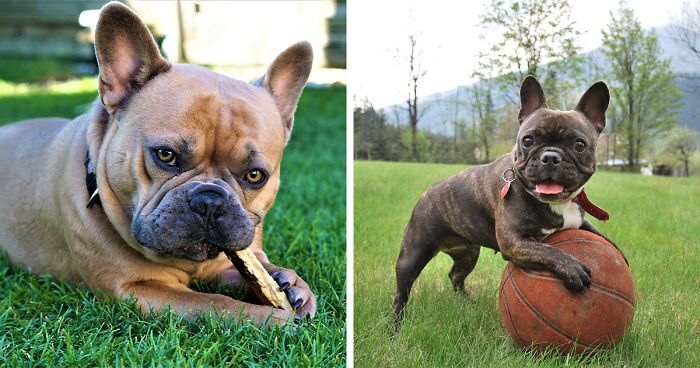
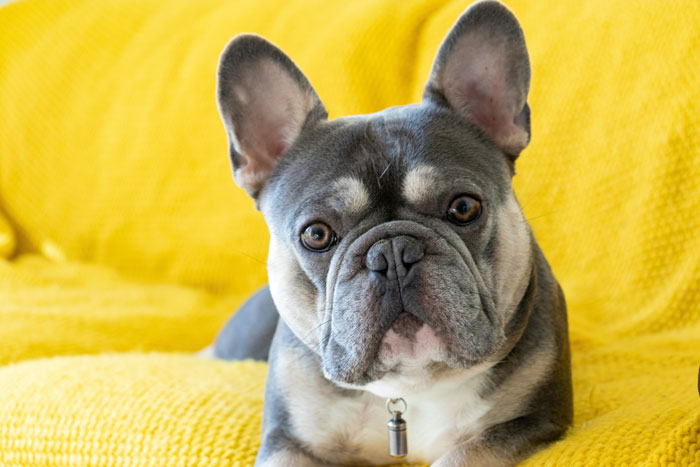 Image credits:
Image credits: 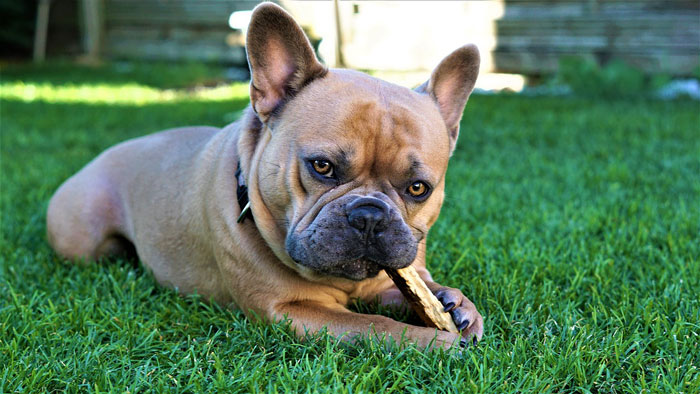 Image credits:
Image credits: 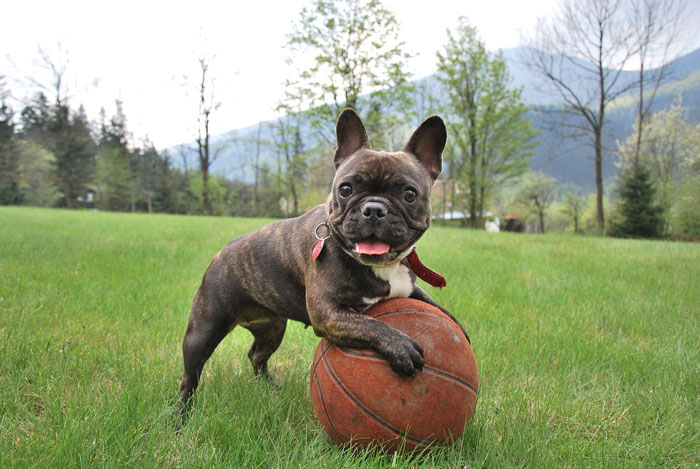 Image credits:
Image credits: 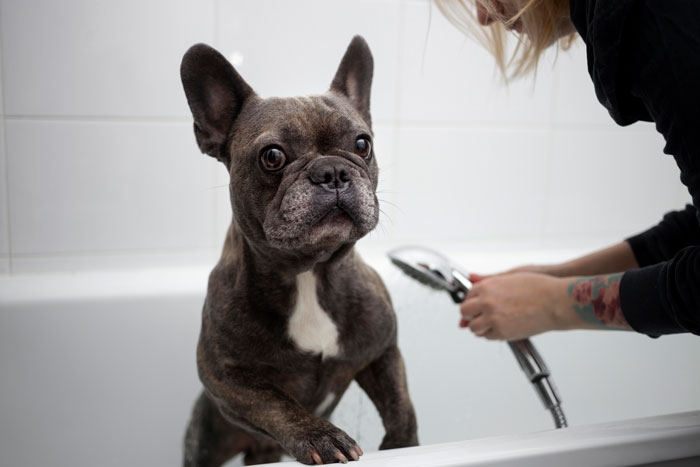 Image credits:
Image credits: 


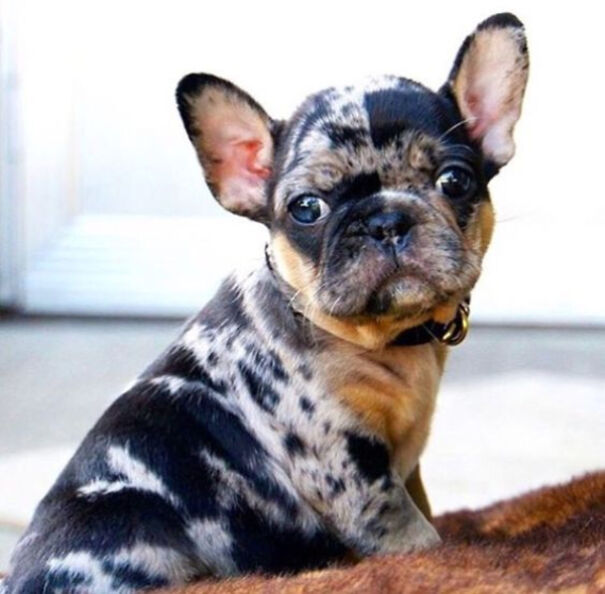
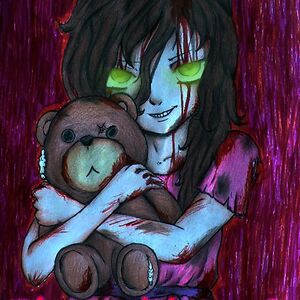









































5
0